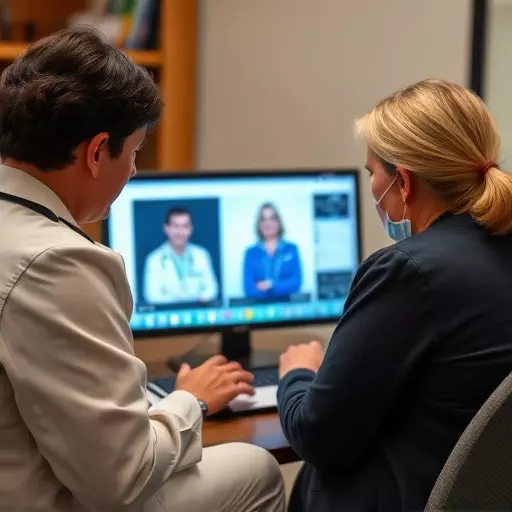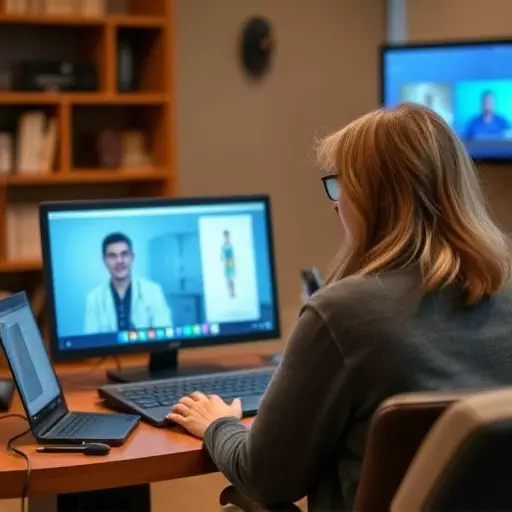Telehealth Ozempic consultations in Warren-Troy-Farmington Hills and rural areas have transformed diabetes management by providing convenient access to specialized care via virtual appointments. While successful implementation hinges on overcoming technological barriers like unreliable internet and lack of digital literacy, addressing privacy concerns through robust security measures, encryption, and patient education is crucial for building trust. Adopting standard communication protocols, strong encryption, clear data policies, and proactive consent mechanisms ensure the ethical delivery of secure telehealth Ozempic services, protecting sensitive health information in line with HIPAA regulations, and offering accessible weight loss care for all communities.
In today’s digital era, telemedicine has revolutionized healthcare access, especially for rural communities. The integration of Ozempic, a key component in diabetes management, into telehealth consultations in Warren-Troy-Farmington Hills has shown significant promise. However, ensuring platform interoperability is crucial to overcoming technological barriers that rural patients often face. This article explores strategies to streamline these processes, addressing privacy concerns and facilitating accessible, effective telemedicine Ozempic care for all.
- Understanding Telehealth Ozempic Consultations in Warren-Troy-Farmington Hills
- Overcoming Technological Barriers for Rural Patients in Telemedicine Weight Loss Care
- Addressing Privacy Concerns in Telemedicine Weight Loss Programs
- Strategies to Ensure Platform Interoperability in Telehealth Ozempic Services
Understanding Telehealth Ozempic Consultations in Warren-Troy-Farmington Hills

In Warren-Troy-Farmington Hills and across rural areas nationwide, telehealth Ozempic consultations have emerged as a transformative solution for managing type 2 diabetes. These virtual appointments leverage telemedicine platforms to connect patients with healthcare providers, overcoming geographical barriers that traditionally hinder access to specialized care. By facilitating remote monitoring and personalized treatment plans, telehealth Ozempic consultations offer a convenient and effective alternative to in-person visits, especially for individuals living in areas with limited medical resources.
However, ensuring seamless interoperability between various telemedicine platforms is paramount to the success of these initiatives. Overcoming technological barriers involves integrating different systems to securely share patient data, such as lab results and medication histories. Moreover, addressing privacy concerns related to telemedicine weight loss care is crucial, as patients expect their sensitive health information to be protected during virtual consultations. Implementing robust security measures and adhering to strict data privacy regulations, like HIPAA in the U.S., are essential steps to fostering trust and ensuring the ethical delivery of telehealth Ozempic programs.
Overcoming Technological Barriers for Rural Patients in Telemedicine Weight Loss Care

In rural areas, where healthcare access is often limited, telemedicine Ozempic consultations offer a promising solution for managing type 2 diabetes and supporting weight loss journeys. However, overcoming technological barriers is essential to ensure successful implementation of telehealth services in these communities. Many rural patients face challenges such as unreliable internet connections, lack of digital literacy, and limited access to suitable devices, hindering their ability to participate effectively in remote care.
Addressing privacy concerns is another critical aspect when providing telemedicine weight loss care. As sensitive health data is exchanged during consultations, implementing robust security measures and ensuring compliance with data protection regulations are vital. By investing in secure platforms, encrypting patient information, and educating both healthcare providers and patients on privacy best practices, it becomes possible to build trust and encourage the adoption of telehealth services, making quality diabetes management accessible to all, regardless of their geographical location.
Addressing Privacy Concerns in Telemedicine Weight Loss Programs

In the realm of telemedicine Ozempic programs, addressing privacy concerns is paramount to fostering patient trust and ensuring effective care. As telehealth consultations gain popularity in weight loss management, particularly in areas like Warren, Troy, and Farmington Hills, protecting sensitive health information becomes a shared responsibility between healthcare providers and patients. Overcoming technological barriers, especially for rural populations, necessitates robust security measures to safeguard data during transmission and storage.
Implementing stringent privacy protocols, such as encryption and secure access controls, is crucial in telemedicine settings. Patients must be educated on the importance of safeguarding personal health information, including sharing details only with authorized personnel. By addressing these concerns proactively, healthcare organizations can offer accessible and reliable weight loss care through telemedicine Ozempic consultations while maintaining the highest standards of privacy for their rural and urban patients alike.
Strategies to Ensure Platform Interoperability in Telehealth Ozempic Services

To ensure platform interoperability in telehealth Ozempic services, providers must implement several strategic approaches. One key strategy is adopting standard communication protocols and data formats, such as HL7 and FHIR, to facilitate seamless information exchange between different systems. This is particularly crucial for rural patients facing technological barriers; standardized platforms enable them to access necessary care regardless of the healthcare provider they choose.
Additionally, addressing privacy concerns is essential in telemedicine weight loss care. Implementing robust security measures, including encryption protocols and strict access controls, helps protect sensitive patient data. Clear communication about data usage and privacy policies, along with patient consent mechanisms, builds trust and ensures compliance with regulatory frameworks like HIPAA. These steps are vital for maintaining interoperability while safeguarding patient confidentiality.
